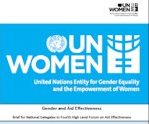ForewordAt the end of November 2011, over 2,000 delegates from international donors, governments, civil society organizations, the private sector, and academia will gather in Busan, South Korea, to debate making aid more effective at the Fourth High Level Forum on Aid Effectiveness (HLF4), the tri-yearly meetings launched by the Organisation for Economic Cooperation and Development (OECD).
In addition to reporting on the success of past efforts, HLF4 delegates will consider how to cope with new challenges in making aid more effective.
These challenges include declining funding from the countries that have traditionally provided aid, and the emergence of new donors and investors who have not yet pledged to follow key principles of aid effectiveness (national ownership, donor coordination, transparency, consultation with civil society, and the promotion of human rights and environmental sustainability).
Research shows that despite decades of effort and trillions of dollars spent on aid, there is still a large gap between men and women in terms of access to the resources and benefits of their societies. This is especially the case in poorer countries.
Gender inequality is not only contrary to human rights and social justice, but results in serious waste of the talents and potential of half the world’s population. Research clearly shows that economies do significantly better when the gap between men and women shrinks, and that when funding is targeted at women and girls, the results are often outstanding.

